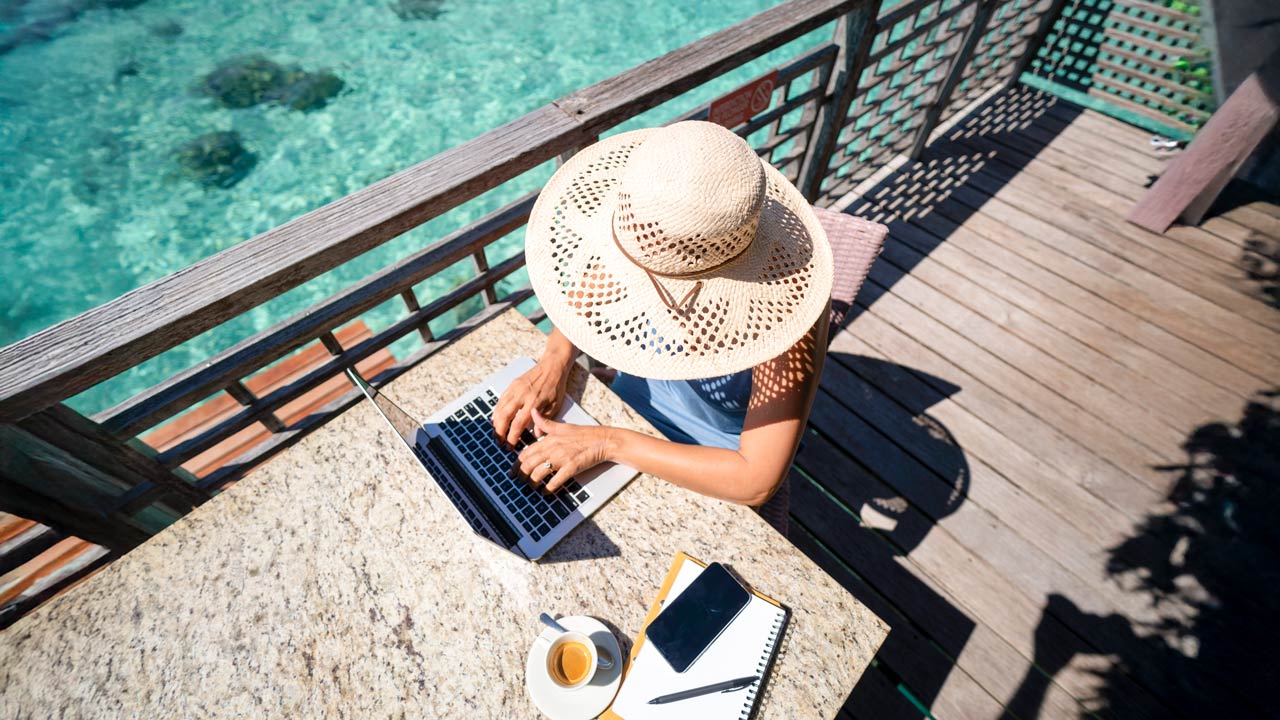Personal cyber risks while travelling: tips to protect yourself on holiday
On the beaches of the Caribbean, between white and grey sands, the sea breeze blew gently as Lucía, Marcos, and Pilar, three young executives, enjoyed a cocktail on their hotel’s beachfront terrace. It was their first trip together in several months and, as is typical for their generation, they were constantly using their smartphones: snapping pictures, making payments through mobile apps, sharing content on social media, and connecting to the hotel’s free wifi to check emails and handle pending tasks.
Until their peace was disrupted when Marcos received an unusual notification about unauthorized activity in his bank account. In just a few minutes, what had been an ideal holiday experience turned into a digital emergency.
What Marcos didn’t know was that he had fallen victim to a cyberattack while enjoying the sun, the sand, and a delicious piña colada. By connecting to unsecured public networks, sharing his location in real time, and accessing sensitive services without protection, he had left invisible doors open to cybercriminals. His story is not an exception, but a reflection of what happens to thousands of unaware travellers every year. Are you ready to protect your time off without giving up a secure connection? Your holidays also have a digital component—protect them by following these recommendations.
Your privacy and security shouldn’t take a holiday, even if you do.
Public wifi networks
- Avoid sensitive transactions: Need to check your bank account or make an online purchase? Use your mobile data or wait until you're connected to a secure network.
—Public wifi networks (airports, cafés, hotels) are a hotspot for cybercriminals waiting to intercept your data. - Use a VPN: If you must connect to a public network, use a Virtual Private Network (VPN). It encrypts your connection and creates a secure tunnel for your data.
—It’s your digital shield in unfamiliar environments. “Never trust, always verify.” - Disable auto-connect: Set your device to avoid automatic connections to open wifi networks.
—Always double-check which network you’re joining.
Your memories should live in photos, not in Cyber Security incidents.
Social media and geolocation
- Delay your posts: Do you really need to announce your house is empty by sharing every step of your trip in real time? Wait until you’re back to post detailed photos.
—Cybercriminals use this information to plan theft or other malicious actions. - Disable geolocation: Review your app settings. Turn off the automatic geotagging feature on your photos and posts.
—Don’t give away your location—or your absence—to just anyone. Avoid oversharing information that could put you at risk. - Review your privacy settings: Before you leave, take a few minutes to check your social media privacy settings.
—Make sure only trusted contacts can see your content.
Travelling light doesn’t mean leaving digital security behind.
Lost or stolen devices
- Use strong passwords and remote lock: All your devices (phone, tablet, laptop) should be protected with strong passwords and, if possible, two-factor authentication.
—Also enable remote lock or wipe options. If your device goes missing, you’ll be able to protect your data. - Back up your data: Before your trip, back up all important data.
—If you lose your device, at least you won’t lose your valuable photos and files. - Don’t store passwords: Avoid saving passwords in your browser or in unsecured notes.
—If your device falls into the wrong hands, don’t make it easier for attackers to access your accounts.
Protecting your data is also your responsibility.
Identity theft (phishing)
- Verify the source: You receive an email from your hotel or a rental company asking you to confirm your details or make an extra payment. STOP. BREATHE.
—Don’t trust any email requesting sensitive information—always verify first. - Check the sender: Look carefully at the sender’s email address.
—A small typo or misspelling often reveals the scam. Don’t click on suspicious links. - Contact them directly: If in doubt, don’t reply to the email.
—Call the hotel or rental company directly using the official phone number from their website (not the one in the suspicious email) to verify the information. - Watch out for “last-minute deals”: Cybercriminals create fake websites that imitate travel agencies or airlines with irresistible offers.
—Before clicking, contact and verify through official sources.
Now, when Lucía, Marcos and Pilar travel, they enjoy a wonderful experience prioritising their digital security by staying calm, verifying before acting, and resisting urgency, ensuring their summer memories are filled with fun and relaxation, not cyber scares. Enjoying your holiday safely starts with you!
 Hybrid Cloud
Hybrid Cloud Cyber Security & NaaS
Cyber Security & NaaS AI & Data
AI & Data IoT & Connectivity
IoT & Connectivity Business Applications
Business Applications Intelligent Workplace
Intelligent Workplace Consulting & Professional Services
Consulting & Professional Services Small Medium Enterprise
Small Medium Enterprise Health and Social Care
Health and Social Care Industry
Industry Retail
Retail Tourism and Leisure
Tourism and Leisure Transport & Logistics
Transport & Logistics Energy & Utilities
Energy & Utilities Banking and Finance
Banking and Finance Smart Cities
Smart Cities Public Sector
Public Sector





